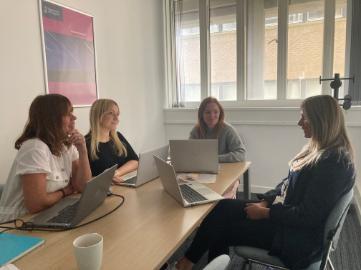HR Professionals Share...
Published: 1 September 2023
Behind the Scenes: HR Professionals Reflect on Their Dynamic Roles
Human Resources (HR) professionals play a pivotal role in shaping the working environment and ensuring that the gears of an organisation run smoothly. We sat down with Leilah Beattie, Stephanie Duffy, Angela Loy and Janine McGregor, working as working as Advisers and Business Partners across CoSE. Each of them brings a unique perspective and insight into their role. From making impactful changes in employees' lives to navigating the challenges of a constantly evolving landscape, they shed light on their journeys and the essence of their work.

What made you decide to pursue a career in HR?
Stephanie: I wish I could say that I always wanted to pursue a career in Human Resources, but that’s not the case. From a young age I wanted to be a nurse, so I gave that a go for a very short time and it wasn’t for me. I then worked in various administrative roles before going back to university to study Business & Management and I found the HR modules to be really interesting and that’s when I decided I wanted to be an HR professional.
My job in three words: Diverse, challenging and busy. - Angela
Describe your job in 3 words.
Leilah: People-focussed. problem-solver, strategy
Stephanie: Busy, challenging and fulfilling.
Angela: Diverse, challenging and busy.
Janine: Impactful, insightful, fulfilling.
How do you build and maintain strong relationships with staff?
Angela: Building and sustaining strong staff relationships involves a few key aspects. First, being well-versed in my field is crucial. I also offer impartial and balanced advice, sometimes acting as a critical friend. An open and honest approach further cements these connections.
What's the most rewarding part of your role?
Leilah: When you can see a shift in mindset or behaviour knowing that you had a part to play in that change through providing support and guidance.
Adapting to constant change keeps things interesting in our role, where we support colleagues facing life's complexities. - Leilah
What are some challenges in the role?
Leilah: We support colleagues who deal with the complexities of life every day. We need to be emotionally intelligent enough to read between the lines and operate within the grey areas, and we do this in and environment where ‘the only constant in life is change’. This requires us to be adaptable and flexible and have the skill to quickly rearrange priorities to execute emerging needs. While this is a challenge it certainly keeps things interesting. Moreover, stigma of HR and the barriers that HR are often perceived to be can be a significant challenge. I try to change this perception by helping colleagues understand the value of our contribution, and by showing how accessible and helpful we
Angela: One of the challenges is being an expert in a wide range of People and Organisational Development (P&OD) areas. This means understanding everything from policies to talent management. Then there's the balancing act between strategic planning and day-to-day operations. Additionally, delivering difficult messages, like feedback or layoffs, can be tough. And in the education sector, there are unique nuances to navigate, especially if you're new to the university environment.
Share a memorable experience where you were able to make a positive impact on an employee's career or work situation.
Janine: As my career in HR has progressed, I have enjoyed encouraging and working with early career colleagues over the years and feel inspired seeing their careers’ flourish as they become more experienced and are themselves passing their knowledge onto others.
I have been involved in many sensitive employee relations situations over the years, these are often the hardest to support and guide but the feeling of having made a difference, of ensuring a situation is handled with dignity with those involved maybe not necessarily agreeing with the course of action but trusting that it was the right one, is something that gives me a real sense of making a difference through HR.
Embracing change and empowering decisions define our purpose in HR. - Janine
What does a normal work week look like for you?
Janine: As an HR Adviser, my main role is to advise and coach, managers in particular, but any UofG colleague looking for advice and guidance. This can range from regrading applications to employee relations situations with focus on case management, through formal training by way of our manager bitesize sessions or informal chats talking through a particular issue. I feel my purpose is to foremost listen, and to use my experience to empower decision making whilst always advocating being reasonable, fair and kind.
Angela: Describing a regular work week is a bit tricky. Plans are there, but we often need to react to various activities across the college and university. With a broad scope, my tasks vary widely. I'm engaged in employee relations, policies, and procedures, as well as handling organisational changes and strategic plans. Supporting colleagues, managers, and leaders is a big part of what I do, covering areas from talent management to recruitment and P&OD projects.
Resilience, empathy, and open-mindedness are key qualities for navigating HR challenges. – Stephanie
What personal qualities do you find essential working in HR?
Leilah: Integrity is one of the most important qualities along with making ethical decisions. It is also imperative that we maintain confidentiality and build trust.
Stephanie: I would say there are three: Resilience – I’ve learned over time that thick skin is essential when it comes to working in HR, as well as the ability to bounce back from difficult situations quickly. Empathy – Being able to understand other people’s thoughts and feelings without judgement or prejudice. I always try to put myself in someone else’s shoes, even if I don’t have first-hand experience of their situation. Open mindedness – When it comes to employee relations matters it’s important to stay open to new ideas, possibilities and solutions.
What's your favourite aspect of working with the university's staff?
Stephanie: I enjoy building relationships with new colleagues across the college, particularly when it comes to working on employee relations matters. It’s great to work collaboratively to share ideas, support each other and come up with practical solutions together.
How do you approach difficult employee situations?
Stephanie: I don’t think there is a one size fits all answer to this question. Every situation is different, but the most important thing is to listen to the employee to understand the circumstances, and, if possible, work collaboratively to find a solution.
How do you ensure fairness and equity when dealing with employee concerns or conflicts?
Angela: Promoting fairness and equity during employee concerns or conflicts involves several steps. Showing respect and encouraging mutual respect is fundamental. Being attuned to others' well-being, offering advice that aligns with policies and laws, modelling appropriate behaviour, and upholding the university's values are all essential components.
How do you keep up with the latest trends and developments in HR practices?
Janine: As a member of the HR professional body – CIPD (Chartered Institute of Personnel and Development), I receive a daily email with updates on case law and general developments in HR. Their quarterly magazine and website are a great source of information too. I also read HR related articles on LinkedIn and find the UofG monthly surgeries with Shepherd and Wedderburn really informative as well as of course our local CoSE HR meetings where we share best practice and reflective learning.
What advice would you give to university staff members who are facing a challenge or issue in their work?
Leilah: Please come to HR for a chat, we’re here to talk through your concerns no matter how big or small the issue is. We’ll always do our best to support your needs.
What's the biggest challenge you face in your role, and how do you tackle it?
Leilah: The stigma of HR and the barriers that HR are often perceived to be. I try to change this perception by helping colleagues understand the value of our contribution, and by showing how accessible and helpful we can be.
Can you tell us about a specific challenge you faced and how you overcame it?
Janine: Having spent over 10 years as an HR project manager, I welcomed a move into more employee relations related work in 2017 including redeployment and wider case work. By mid-2020, I was being asked to return to lead on a new project, I took the difficult, but in hindsight, best decision to leave my post after 17 years as I felt employee relations and in particular case management were where my skills best lay. It is never too late to change and go for what you really want to do. 30 years in the workplace but a relative “newbie” with UofG - still learning and honing my skills!
How do you strike a work-life balance while dealing with the demands of your role?
Stephanie: There are times when I am not very good at this, as I often find it difficult to switch off from work. I am fortunate enough to have a flexible working arrangement which means that I get to spend more quality time with my two young children.
Share a fun or interesting anecdote from your time working in HR.
Janine: One from the archives! As a new HR Project Manager in 2005, I was tasked with the evaluation of 1,500 job descriptions as part of the NHS Agenda for Change project. Cue 100 newly trained job evaluators, a new computer aided job evaluation computer system and I decanting to the local football stadium for 3 x 6 weeks blocks between September and May 2006. It was the first time I'd seen a wall mounted flat screen tv! The evaluators were pooled across all job families from physiotherapists to porters, finance managers to nurses, all four trade unions were represented and everyone in between. It was a great experience overseeing the panels, consistency checking the outcomes, watching the different working styles and lively debates. It was a crash course on so many aspects of the importance of good HR. Our last week at the stadium was just before I finished up for maternity leave in May 2006, the project had felt like my baby and here I was about to have an actual one!
As we've delved into the worlds of these HR professionals, one thing is clear: their roles are multifaceted and challenging, yet deeply rewarding. From navigating complexities and fostering connections to staying updated with trends, they exemplify the evolving landscape of Human Resources. As we reflect on their insights, it's evident that HR is more than just a department—it's a vital force in shaping workplaces and empowering individuals.
First published: 1 September 2023
<< News


